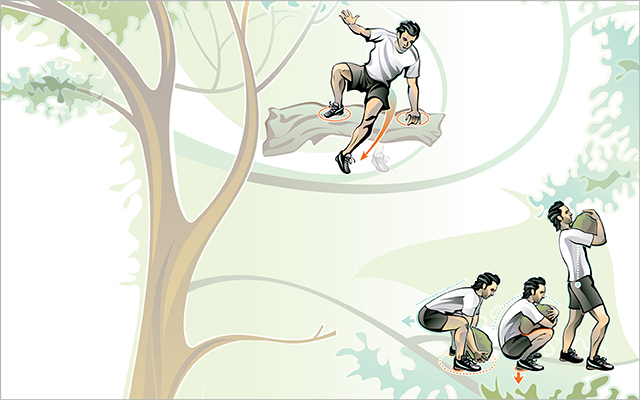After taking a stroll around your local park today, you may notice you’re feeling lighter, more focused, a little less stressed. Those benefits aren’t imagined — nature is good medicine.
It’s so beneficial, in fact, that a growing number of health professionals have started writing “nature prescriptions” to treat numerous ailments, including depression and hypertension.
One such doctor is Robert Zarr, MD, MPH, founder and medical director of Park Rx America, a nonprofit dedicated to promoting nature medicine to physicians and patients nationwide. Among the organization’s offerings is a tool designed to help providers locate parks near a patient’s home.
While some might scoff at such a “soft” prescription, evidence supporting the relationship between nature and health continues to grow. Research also shows that most of us don’t capitalize on it: Americans spend less than 8 percent of their time outdoors.
That may be changing. “Ironically, the 2020 coronavirus pandemic, as tragic as it has been, has dramatically increased public awareness of the deep human need for nature connection,” Richard Louv, journalist and author of Last Child in the Woods, told the New York Times last year. “[It’s] adding a greater sense of urgency to the movement to connect children, families, and communities to nature.”
These benefits might convince you to take a regular dose of Nature Rx.
Boosts Mood
The Japanese practice of shinrin-yoku, or forest bathing, has become increasingly popular worldwide over the last four decades. The benefits include mood improvements and reduced stress.
In a 2019 study published by Environmental Health and Preventive Medicine, researchers recorded 155 participants’ blood pressure and self-reported mood before and after a forest-bathing session. Of those participants, 37 percent had displayed depressive tendencies. While all participants exhibited reductions in blood pressure and heightened mood after forest bathing, those with depressive tendencies showed the greatest improvements in mood and relaxation.
Supports Well-Being
Individuals who spent at least two hours a week outdoors were more likely to report having good health and a strong sense of well-being, according to a 2019 study led by environmental psychologist Mathew White, PhD.
“We had no idea what a threshold might be — so two hours was unexpected but a relatively pleasant surprise,” says White. “It’s doable for most people, either in a few small bursts or one long trip to the park on weekends.”
The researchers noted no difference between participants who spent their time outside exercising and those who did not exercise, he adds.
Improves Workout Satisfaction
You don’t have to exercise outdoors to experience nature’s health benefits, yet studies show that taking your workout to the park might make it seem more fun. In a 2017 study, English researchers observed the effects of viewing natural scenes versus choosing personal entertainment while running on a treadmill. They found that those who selected entertainment ran farther and had higher heart rates than those who looked at natural environments, but participants in the nature-viewing groups reported higher levels of happiness after their run.
Protects Vision
Myopia has risen in prevalence over the past 50 years, which may be related to increased time spent indoors. Although one might expect the correlation to stem from excessive screen time, the issue may have more to do with a lack of natural-light exposure and a greater focus on activities performed at a short distance, such as reading, studying, and gaming.
A 2015 meta-analysis discovered that children who spent more time on “near work” had a 14 percent higher chance of developing myopia, and that an individual’s risk of developing the condition increased by 2 percent for every additional hour doing near work per week.
Additionally, a 2017 study published in JAMA Ophthalmology found that participants who had spent more time exposed to sunlight’s UVB, or ultraviolet B, radiation in adolescence or young-adulthood were less likely to develop myopia.
Encourages Healing
Nearly four decades ago, environmental psychologist Roger Ulrich, PhD, studied patients recovering from gallbladder surgery and established a connection between natural views and improved health outcomes.
Since Ulrich’s study, evidence supporting nature’s healing powers has grown. For example, a 2019 study conducted by researchers in a psychiatric unit found that patients who spent time in green spaces reported feeling calmer and less isolated.
Strengthens Immunity
When we engage with nature, we expose ourselves to natural microbes that help diversify our microbiomes and support our immune systems. In a study published in Science Advances in 2020, researchers added natural elements, including lawn turf and planter boxes, to playgrounds at urban daycares. After just one month, the researchers noted a significant increase in the microbial diversity of the children’s skin, and positive changes in proteins and cells that support immune function.
Hones Focus
ADHD affects as many as one in 20 American children, with symptoms including hyperactivity, difficulty focusing, and lack of restraint — all of which can hinder learning in traditional classroom settings. Yet studies show that spending time outside may mitigate these symptoms.
Children diagnosed with ADHD showed improvements in concentration after 20 minutes of walking through a park, according to a University of Illinois study. Follow-up research from the study authors suggests that children with regular access to natural environments exhibit milder ADHD symptoms than those who mostly play inside or on playgrounds.
“Frequency appears to be important,” adds Andrea Faber Taylor, PhD, one of the studies’ lead authors. “Schedule it on your calendar like you do piano lessons or karate class, e.g., ‘Park visit’ or ‘backyard playtime.’ . . . Be systematic about it and you will likely see more benefits due to the routine exposures and thus the routine support of attentional functioning.”
Reduces Rumination
While the majority of us choose to live in urban areas, researchers have found an association between urbanization and increased rates of mental illness. Thankfully, a little time in nature may help city dwellers find some peace of mind.
A 2015 Stanford University study found that participants who spent 90 minutes walking in a natural environment reported reduced levels of rumination — a known symptom of depression — compared with those who strolled around the city.
Enhances Creativity
When you’re struggling to find a creative flow, the antidote may be outside your door. A 2015 study found that participants who spent six days immersed in nature performed significantly better on a creativity assessment than those who stayed inside for the same length of time.
Ways to Take it Outside
Looking for more ways to get outdoors? These articles offer a wealth of ideas.





This Post Has 0 Comments